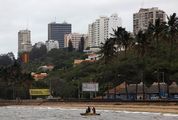MORE than a month after the start of the Fees Must Fall protests, students are still struggling with university administrations. In recent weeks, these struggles have become increasingly brutal; the police are now regular visitors to campuses, and students have begun to act violently.
This was not inevitable. The ways in which the protests have developed have been shaped by a struggle over who has the right to speak for students.
In particular, students grouped as #FeesMustFall have been suspicious of elected student representative councils (SRCs). Nonetheless, many universities limited their engagement with students to these bodies. The tensions that arose from this have shaped developments.
At the University of the Western Cape, for example, the SRC elections in September resulted in the election of a 10-member team who are all members of the government-aligned South African Students Congress (Sasco). Other student organisations alleged fraud or, at least, the infringement of rules during the election. The result may have amplified these concerns.
At the University of Johannesburg, the SRC occupied an ambiguous and changing role in the protests. A fortnight ago, a group of students attempting to occupy the vice-chancellor’s office expressed doubts about the SRC’s commitment to the struggle, linking this to a critique of the dominance of Sasco members on the council.
At Wits University, the relationship between the SRC and some of the protesting students degenerated at the end of the second week of the protest.
As the SRC discussed accepting a proposal from the university, other students stormed its meeting. Afterwards, the rhetoric heated up. Some accused the SRC of being "sellouts". A connection between the African National Congress and the largest group in the SRC, the Progressive Youth Alliance, was again invoked.
There is more to this than the suspicion of particular political groupings. In each of these examples, the SRC was placed in an invidious position: the university administrations insisted on speaking only to elected student representatives.
This is a familiar pattern across the country. In the course of engaging with insurgent communities, the local state has regularly refused to engage with unlicensed groups of activists and insists, instead, on speaking only to those who participate in formal spaces.
US academic Faranak Miraftab explains this practice by contrasting the state’s willingness to engage with activists it has "invited" to speak with its related reluctance to engage in conversations "invented" by activists and forced on it.
Miraftab argues that community activism always takes place in both kinds of spaces but that the contemporary South African state recognises activism only in "invited" spaces as legitimate. Actions in "invented" spaces — protests on the streets — are seen as being illegitimate or illegal.
For many insurgent communities, the local state’s embrace of particular institutions of participation has rendered these institutions suspicious. Petitions committees, ward committees and community policing forums seem to be, and often are, sites of patronage.
This has led these communities to reject local political representation through ward councillors and their committees. Instead of following the formal system, community politics is increasingly found outside: on the streets, in publicly disruptive practices and in "invented" spaces.
In the eyes of local police service, this popular insurgency is presumptively illegal and the structures of community activism presumptively illegitimate. This is true whether or not the protests are violent.
It has led to the adoption of routinely brutal practices of community policing. Allegations of violence proliferate in the aftermath of a protest, and criminal charges are levied against known "troublemakers". Far too often, these charges are manufactured by the police seeking an ex post facto justification for arrests.
In the context of the student protests, universities have sought to "invite" engagement in formal spaces and have insisted that the invitations are conditional on membership in an elected representative body. That body is inevitably the university’s SRC. Administrators refuse to engage with students outside, including the groups occupying the university without licence.
These unlicensed students describe themselves as representing a national student uprising on their campuses. They often emphasise the catholic nature of their politics and their independence from formal political arrangements.
These arrangements are explicitly anti-hierarchical: they resist the nomination of leaders and representatives, and refuse to delegate authority to anyone to negotiate with the university on their behalf.
This creates difficulties for universities: the structures of negotiation require parties to meet, discuss and — inevitably — compromise. It requires the apparent equality of parties, which is most often achieved by ensuring that negotiations take place between small groups.
It is easy to see how the reluctance of students to recognise their elected representatives throws this system into disarray. Without the ability to assume the legitimacy of their preferred negotiating partners, administrators are faced with the meaninglessness of these talks.
No agreement thrashed out with an SRC will be respected. But talking to hundreds of students at once makes a mockery of the politesse of the negotiating table: authorities are humiliated, louder voices dominate and compromises may be rejected.
How universities respond to this is important. They can align themselves with those who refuse to acknowledge action in "invented" spaces, and retreat to a laager. They can call on the police to control the spaces outside. Or they can accept the unpredictability that comes from recognising the fact of action in both "invited" and "invented" spaces and respond to the demand for direct engagement. In doing so, though, they embark on a process of contestation rather than negotiation and risk abetting the erosion of legitimacy of campus elections and mandates.
The past weeks have given us examples of both responses, sometimes on the same campus. At Wits, the administration vacillated between attempts to separate the SRC from the remainder of the students, and efforts to engage with students as a collective.
We have the image of vice-chancellor Adam Habib sitting on the floor with students and, simultaneously, the image of armed policemen prowling the campus. Tensions between the university and students tended to decline when the administration engaged within "invented" spaces, but ratcheted upwards when it sought to bypass them.
At the University of Johannesburg and University of the Western Cape, the scenario is playing out in a different way. The administrations have largely refused to recognise action in "invented" spaces and insisted on seeing the legitimacy of only the SRC.
When engagements happen, they appear insincere and do not convince the assembled students. Negotiations proceeded within "invited" spaces. The agreements emerging from them have little legitimacy or support. They are abandoned and protests continue.
These protests are increasingly seen as illegitimate and possibly illegal. The police have become a regular presence, sometimes watching and sometimes intervening. When they do, they are brutal in much the same way as they are in other kinds of protests.
And in response, protesting students have resorted to violence of their own.
It is tempting to default to tried-and-tested institutions such as ward committees and SRCs. But in a climate of increasing inequality, exclusion and contestation, these institutions can begin to look more like part of the problem than the solution.
It is sometimes necessary for the authorities to step outside the spaces in which they meet with apparent representatives and to enter the spaces communities invented for themselves. To fail to do so can lead to more of the violence they condemn, and an undermining of the very democratic project they claim to serve.
• Brown is the author of South Africa’s Insurgent Citizens (Jacana)
University of Witwatersrand Vice-Chancellor Adam Habib addressed protesters . The student protests are taking place in ‘invited’ and ‘invented’ spaces, and administrators such as Wits University vice-chancellor Adam Habib (right) are having to navigate the two. Picture: THE TIMES/ALON SKUY
MORE than a month after the start of the Fees Must Fall protests, students are still struggling with university administrations. In recent weeks, these struggles have become increasingly brutal; the police are now regular visitors to campuses, and students have begun to act violently.
This was not inevitable. The ways in which the protests have developed have been shaped by a struggle over who has the right to speak for students.
In particular, students grouped as #FeesMustFall have been suspicious of elected student representative councils (SRCs). Nonetheless, many universities limited their engagement with students to these bodies. The tensions that arose from this have shaped developments.
At the University of the Western Cape, for example, the SRC elections in September resulted in the election of a 10-member team who are all members of the government-aligned South African Students Congress (Sasco). Other student organisations alleged fraud or, at least, the infringement of rules during the election. The result may have amplified these concerns.
At the University of Johannesburg, the SRC occupied an ambiguous and changing role in the protests. A fortnight ago, a group of students attempting to occupy the vice-chancellor’s office expressed doubts about the SRC’s commitment to the struggle, linking this to a critique of the dominance of Sasco members on the council.
At Wits University, the relationship between the SRC and some of the protesting students degenerated at the end of the second week of the protest.
As the SRC discussed accepting a proposal from the university, other students stormed its meeting. Afterwards, the rhetoric heated up. Some accused the SRC of being "sellouts". A connection between the African National Congress and the largest group in the SRC, the Progressive Youth Alliance, was again invoked.
There is more to this than the suspicion of particular political groupings. In each of these examples, the SRC was placed in an invidious position: the university administrations insisted on speaking only to elected student representatives.
This is a familiar pattern across the country. In the course of engaging with insurgent communities, the local state has regularly refused to engage with unlicensed groups of activists and insists, instead, on speaking only to those who participate in formal spaces.
US academic Faranak Miraftab explains this practice by contrasting the state’s willingness to engage with activists it has "invited" to speak with its related reluctance to engage in conversations "invented" by activists and forced on it.
Miraftab argues that community activism always takes place in both kinds of spaces but that the contemporary South African state recognises activism only in "invited" spaces as legitimate. Actions in "invented" spaces — protests on the streets — are seen as being illegitimate or illegal.
For many insurgent communities, the local state’s embrace of particular institutions of participation has rendered these institutions suspicious. Petitions committees, ward committees and community policing forums seem to be, and often are, sites of patronage.
This has led these communities to reject local political representation through ward councillors and their committees. Instead of following the formal system, community politics is increasingly found outside: on the streets, in publicly disruptive practices and in "invented" spaces.
In the eyes of local police service, this popular insurgency is presumptively illegal and the structures of community activism presumptively illegitimate. This is true whether or not the protests are violent.
It has led to the adoption of routinely brutal practices of community policing. Allegations of violence proliferate in the aftermath of a protest, and criminal charges are levied against known "troublemakers". Far too often, these charges are manufactured by the police seeking an ex post facto justification for arrests.
In the context of the student protests, universities have sought to "invite" engagement in formal spaces and have insisted that the invitations are conditional on membership in an elected representative body. That body is inevitably the university’s SRC. Administrators refuse to engage with students outside, including the groups occupying the university without licence.
These unlicensed students describe themselves as representing a national student uprising on their campuses. They often emphasise the catholic nature of their politics and their independence from formal political arrangements.
These arrangements are explicitly anti-hierarchical: they resist the nomination of leaders and representatives, and refuse to delegate authority to anyone to negotiate with the university on their behalf.
This creates difficulties for universities: the structures of negotiation require parties to meet, discuss and — inevitably — compromise. It requires the apparent equality of parties, which is most often achieved by ensuring that negotiations take place between small groups.
It is easy to see how the reluctance of students to recognise their elected representatives throws this system into disarray. Without the ability to assume the legitimacy of their preferred negotiating partners, administrators are faced with the meaninglessness of these talks.
No agreement thrashed out with an SRC will be respected. But talking to hundreds of students at once makes a mockery of the politesse of the negotiating table: authorities are humiliated, louder voices dominate and compromises may be rejected.
How universities respond to this is important. They can align themselves with those who refuse to acknowledge action in "invented" spaces, and retreat to a laager. They can call on the police to control the spaces outside. Or they can accept the unpredictability that comes from recognising the fact of action in both "invited" and "invented" spaces and respond to the demand for direct engagement. In doing so, though, they embark on a process of contestation rather than negotiation and risk abetting the erosion of legitimacy of campus elections and mandates.
The past weeks have given us examples of both responses, sometimes on the same campus. At Wits, the administration vacillated between attempts to separate the SRC from the remainder of the students, and efforts to engage with students as a collective.
We have the image of vice-chancellor Adam Habib sitting on the floor with students and, simultaneously, the image of armed policemen prowling the campus. Tensions between the university and students tended to decline when the administration engaged within "invented" spaces, but ratcheted upwards when it sought to bypass them.
At the University of Johannesburg and University of the Western Cape, the scenario is playing out in a different way. The administrations have largely refused to recognise action in "invented" spaces and insisted on seeing the legitimacy of only the SRC.
When engagements happen, they appear insincere and do not convince the assembled students. Negotiations proceeded within "invited" spaces. The agreements emerging from them have little legitimacy or support. They are abandoned and protests continue.
These protests are increasingly seen as illegitimate and possibly illegal. The police have become a regular presence, sometimes watching and sometimes intervening. When they do, they are brutal in much the same way as they are in other kinds of protests.
And in response, protesting students have resorted to violence of their own.
It is tempting to default to tried-and-tested institutions such as ward committees and SRCs. But in a climate of increasing inequality, exclusion and contestation, these institutions can begin to look more like part of the problem than the solution.
It is sometimes necessary for the authorities to step outside the spaces in which they meet with apparent representatives and to enter the spaces communities invented for themselves. To fail to do so can lead to more of the violence they condemn, and an undermining of the very democratic project they claim to serve.
• Brown is the author of South Africa’s Insurgent Citizens (Jacana)






















Change: 1.37%
Change: 1.32%
Change: 2.91%
Change: 0.45%
Change: 3.09%
Data supplied by Profile Data
Change: 1.63%
Change: 0.83%
Change: 1.37%
Change: 0.00%
Change: 0.69%
Data supplied by Profile Data
Change: -2.04%
Change: -1.78%
Change: -1.55%
Change: -1.86%
Change: -1.48%
Data supplied by Profile Data
Change: -1.19%
Change: 0.31%
Change: -0.65%
Change: -1.39%
Change: 2.92%
Data supplied by Profile Data